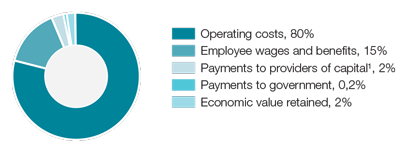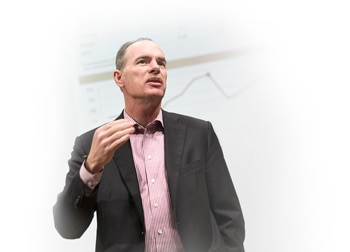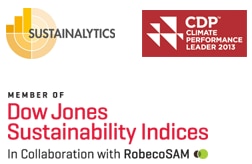ECONOMIC PERFORMANCE
MANAGEMENT APPROACH
Indirect economic impacts are an important part of the value the Group brings to society. They occur both when consumers and professionals use Electrolux products and how the business is operated.

For 2013 information regarding economic management approach and reporting practices, see Accounting and valuation principles and Business areas. Financial objectives are presented in Financial goals.
Financial risks due to climate change
The financial impacts of climate change risks are reported on at length in the Group's yearly reporting to the CDP, as described in Managing sustainability risks. These risks and their associated costs are currently small, but are likely to rise in the medium term.
Market presence
The Workplace Standard stipulates that all employees are expected to be remunerated at levels no less than local minimum wage based on legally stipulated working hours. Additionally, each operational unit is responsible for providing its employees with all legally mandated benefits to which they are entitled (i.e.: medical and social insurance and pensions).
Six countries are represented in Group Management, with seven of 12 members coming from countries outside Sweden—a high number for a Swedish company. Additionally, five of six heads of business areas were locally recruited for their posts and the majority of the members have worked on at least two continents.
Indirect impact
Due to the nature of its operations, significant infrastructure investments are not material to the Group’s business. No operations within the Group are deemed to have negative impacts on their local communities, and Electrolux aims to have a positive impact in the communities where it is active.
Electrolux operations have both direct and indirect impacts on stakeholders such as customers, consumers, suppliers, employees, the public purse and investors. The indirect impacts occur when income earned by these stakeholders in turn circulates as transactions in the economy. Total taxes in 2013 amounted to SEK -232 (-789), corresponding to 25,7% (25.0) of income after financial items.
The average number of employees during the year was 60,754 (59,478).
Statistics for local hiring and the use of locally based suppliers are not collated at Group level. However, the proportion of procurement from low-cost regions increased from 30% in 2004 to approximately 65% (60) in 2013 and is expected to reach approximately 70% by 2015.
Economic contributions of Electrolux products
Indirect economic impacts are an important part of the value the Group brings to society. These impacts occur when consumers and professionals alike use Electrolux products. Small and major appliances—from ovens and refrigerators to washing machines and vacuum cleaners—have changed the way society cleans and launders, cooks and preserves food. By saving time and labor, they free people up to be more productive, fulfilled and empowered, enhancing gender equality.
Electrolux products also help cut public spending by enabling self-reliant lifestyles for the elderly and those with physical disabilities. Two-income families are the norm in Western households and increasingly so in emerging markets. Reduced workloads thanks to appliances are enablers for this lifestyle. This has impacted the workforce in many economies. These impacts have, however, not been formally calculated.
Particularly in emerging markets, billions of people worldwide still live without the benefits of electrical appliances. This is changing. Rising incomes around the world are driving demand, especially in high growth areas in Asia, Latin America and the Middle East. (See video).
Government financial assistance
Financial assistance is reported in the Board of Directors report (Capital Expenditures) and Note 12, Property plant and equipment.
StopSearchHereCEO Statement

In 2013 we continued to deliver above our growth target and delivered 4.5% in organic sales growth.
CEO Statement

I'm convinced that raising product efficiency for the growing middle class is where long-term shareholder value creation lies.
Our products

Electrolux is the only appliance manufacturer in the industry to offer complete solutions for both consumers and professionals. The focus is on innovative and energy-efficient products in the premium segments.
Sustainability
Achieving the Group's vision of sustainability leadership is crucial to realizing the business strategy. The objective is to develop smarter, more accessible, resource-efficient solutions that meet people's needs and improve their lives. Read the comprehensive sustainability performance review.
Awards & recognition

Financial Reporting
Net sales for the Electrolux Group in 2013 amounted to SEK 109,151m, as against SEK 109,994m in the previous year. The organic sales growth was 4.5%, while currencies had an impact of -5.3%.
